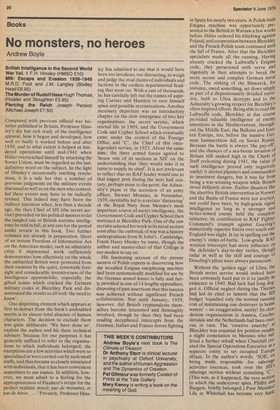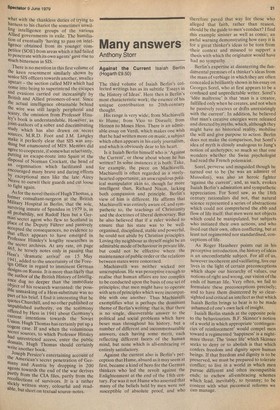Books
No monsters, no heroes
Andrew Boyle
British Intelligence in the Second World War Vol. 1 F.H. Hinsley (HMSO £10) MI9: Escape and Evasion 1939-1945 M.R.D. Foot and J.M. Langley (Bodley Head £6.95) The Murder of Rudolf Hess Hugh Thomas, (Hodder and Stoughton £5.95) Piercing the Reich Joseph Persico (Michael Joseph £7.50) Compared with previous official war histories published in Britain, Professor Hinsley's dry but rich study of the intelligence apparat, how it began and developed, how well or badly it worked before and after 1939, and to what extent it helped or hindered operations until mid-1941 when Hitler overreached himself by attacking the Soviet Union, must be regarded as the last, definitive word on the subject. In the light of Hinsley's occasionally startling revelations, it is a safe bet that a number of previous judgments on the military events discussed as well as on the men who controlled these events may have to be radically revised. This indeed may have been the indirect intention when, less than a decade ago, the then Chief of SIS (the secret service) prevailed on his political masters to let the tangled tale of British wartime intelligence be told in full, at any rate for the period under review in this book. Two further volumes are already in preparation. Short of an instant Freedom of Information Act on the American model, such an admirably crisp if impersonal work sufficiently demonstrates how effectively on the whole the embattled British were protected from their enemies by the quiet, systematic foresight and considerable inventiveness of the Intelligence apparatchiks, especially the gifted teams which cracked the German military codes at Bletchley Park and disseminated the results to all with 'the need to know'.
One dispiriting element which appears at first to detract from the book's undoubted merits is its almost total absence of human characters. The decision to exclude them was quite deliberate: 'We have done so', explain the author and his three technical advisers 'because for our purposes it has generally sufficed to refer to the organisations to which individuals belonged; the exceptions are a few activities which were so specialised or were carried out by such small staffs, and thus became so closely associated with individuals, that it has been convenient sometimes to use names. In addition, however, we must admit to a feeling for the appropriateness of Flaubert's recipe for the perfect realistic novel: pas de monstres, et pas de heros . .' Privately, Professor Hins ley has admitted to me that it would have been too invidious, too distracting, to weigh and judge the rival claims of individuals and factions in the endless departmental feuding that went on. With a cast of thousands, he has carefully left out the names of aspiring Caesars and Hamlets to save himself space and possible recriminations. Another necessary departure was an introductory chapter on the slow emergence of two key organisations: the secret service, which started life in 1909, and the Government Code and Cypher School which eventually came under the control of the Foreign Office and 'C', the Chief of this oncelegendary service, in 1923. About the same time, the three armed forces agreed to 'house one of its sections in SIS' on the understanding that 'they would take it in turns to supply its chief'. It is not irrelevant to reflect that no RAF leader would rise to that august post during the next half century; perhaps more to the point, the Admiralty's pique at the accession of an army officer, Stewart Menzies, in November, 1939, inevitably led to a certain 'distancing' of the Royal Navy from Menzies's most important source of secret intelligence, the Government Code and Cypher School then stationed at Bletchley Park. One of the raw recruits selected for work in its naval section soon after the outbreak of war was a history undergraduate from St John's , Cambridge, Frank Harry Hinsley by name, though the author and master-elect of that College is too modest to say so.
His fascinating account of the prewar success of Polish experts in discovering how the so-called Enigma enciphering machine had been systematically modified for use by the German armed forces is fully and fairly provided in one of 14 lengthy appendices, disposing of past assertions that this success was achieved without significant French collaboration. Not until January, 1939, however, did British cryptanalysts themselves become interested and thoroughly involved, though by then they had been reading decyphered intercepts from the German, Italian and Franco forces fighting in Spain for nearly two years. A Polish-built Enigma machine was opportunely presented to the British in Warsaw a few weeks before Hitler ordered his blitzkrieg against Poland; and cooperation between Bletchley and the French-Polish team continued until the fall of France. After that the Bletchley specialists made all the running. Having already cracked the Luftwaffe's Enigma code, they persevered with verve and ingenuity in their attempts to break the more secure and complex German naval code. The sinking of the Bismarck, for instance, owed something, set down simPlY as part of a dispassionately detailed narrative, both to Ultra decrypts and to the Admiralty's growing respect for Bletchley's often inspired efforts. Being able to read the Luftwaffe code, Bletchley in due course provided valuable intelligence of enenlY intentions in the Mediterranean, throughout the Middle East, the Balkans and Eastern Europe, too, before the massive German hammerblow fell on Soviet Russia. Because the battle is always 'the pay-off", and the chances of a sea-borne invasion of Britain still ranked high in the Chiefs of Staff reckoning during 1941, the value of such intelligence proved only negativelY useful: it alerted planners and commanders to imminent dangers, but it was far from being a war-winning weapon while Britain stood defiantly alone. Earlier disasters like the abortive British intervention in NorwaY and the Battle of France were not averted, nor could have been, by high-grade signal intelligence so long as a stronger and better-armed enemy held the complete initiative; its contribution to RAF Fighter Command's triumph against Goering's numerically superior forces over south east England was slight. It lay in spelling out the enemy's order-of-battle. Low-grade RAF wireless intercepts had more influence on the defender's day-to-day tactics, though radar as well as the skill and courage of Dowding's pilots were always paramount.
Without the 'golden eggs' of Ultra, the British secret service would indeed have been extremely hard put to it to justify its existence in 1940. Bad luck had long dogged it. Official neglect during the Thirties had led its chief to lament that the SIS budget 'equalled only the normal running cost of maintaining one destroyer in home waters' — an exaggeration, surely! Its clandestine organisations in Austria, Czechoslovakia and the Netherlands had been over' run in turn. The `creative anarchy' 3t Bletchley was essential for positive results, a slight consolation to Menzies who St& fered a further rebuff when Churchill created the Special Operations Executive as a separate entity to set occupied Europe ablaze. In the author's words: `SOE, 00 being made responsible for sabotage activities overseas, took over the SIS,s sabotage section without consulting 'C' • (This was, as it happened, the very section to which the undercover spies, Philby Our Burgess, briefly belonged.) Poor Menzies. Life in Whitehall has become very hard' What with the thankless duties of trying to harness to his chariot the sometimes unwilling intelligence groups of the various Allied governments in exile. The humiliation of eventually 'having to pass on intelligence obtained from its younger competitor (SOE) from areas which it had failed to penetrate with its own agents' gave rise to much bitterness in SIS.
There is no mention in this first volume of the keen resentment similarly shown by senior SIS officers towards another, smaller upstart — the section called MI9 which had come into being to superintend the escapes and evasions carried out increasingly by British and Allied prisoners-of-war. Since the actual intelligence obtainable behind the wire was still largely peripheral and scanty, the omission from Professor Hinsley's book is understandable. However, as joint-authors of a sober and discriminating study which has also drawn on secret sources, M.R.D. Foot and J.M. Langley make it perfectly clear that SIS was anything but enamoured of MI9. Menzies did agree to cooperate, if somewhat reluctantly, Putting an escape-route into Spain at the disposal of Norman Crockatt, the head of an organisation which facilitated and encouraged many brave and daring efforts by exceptional men like the late Airey Neave to outwit their guards and cut loose to fight again.
As for the novel thesis of Hugh Thomas, a former consultant-surgeon at the British Military Hospital in Berlin, that the sole, surviving inmate of Spandau in 1979 is, in all probability, not Rudolf Hess but a German secret agent who flew to Scotland in Place of the Deputy Fiihrer and passively accepted the consequences, no evidence to that effect appears to have emerged in Professor Hinsley's lengthy researches in the secret archives. At any rate, on page 465, he tersely notes only in passing that Hess's 'dramatic arrival' on 15 May 1941, added to the uncertainty of the Fore'8n Office in regard to imminent German designs on Russia. It is more than likely that the author of the British History of Intelligence dug no deeper than the immediate Object of his research warranted: the possible unmasking of a Hess-substitute was no Part of his brief. I find it interesting that he quotes Churchill, and no other published or unpublished authority, on the testimony Offered by Hess in 1941 about Germany's current intentions towards the Soviet Union. Hugh Thomas has certainly put up a cogent case. If and when the voluminous secret sources, to which Professor Hinsley had unrestricted access, enter the public domain, Hugh Thomas should certainly Write another book. Joseph Persico's entertaining account of the American's secret penetration of Germany and Austria by dropping in 200 agents towards the end of the war derives Partly from the CIA files, partly from the recollections of survivors. It is a rather Slickly written story, colourful and readable, but short on textual source-notes.











































 Previous page
Previous page